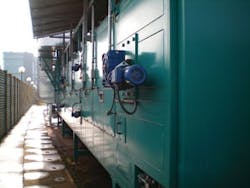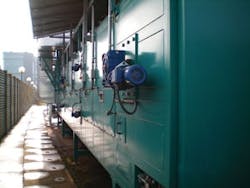HYBACS wastewater treatment plant installed in Spain
• Nutrient removal and water reuse capabilities attract government investment
The project is supported by grant funding of nearly €90,000 to Aqualia Infraestructuras, an engineering subsidiary, from the Spanish Environment Ministry (Ministerio de Medio Ambiente, Medio Rural y Marino; MARM). The plant installation is part of Bluewater Bio's exclusive agreement signed last year with Aqualia to promote the HYBACS technology.
Daniel Ishag, CEO of Bluewater Bio, comments: "The Spanish wastewater treatment market has immense potential for expansion and represents a key market for Bluewater Bio. Aqualia is one of the world's largest wastewater companies and we are delighted to have achieved this latest milestone for HYBACS as Aqualia's first unit is installed in the Ávila plant. We are looking forward to working with Aqualia to roll out the technology throughout Spain, a country with a severe requirement to conserve and reuse water. Further afield, Aqualia is working with us on consortium bids in the Middle East and beyond, leveraging its position within global infrastructure giant Grupo FCC which manages water and wastewater related projects in over 850 municipalities on five continents."
Compared with competing processes such as conventional nutrient removal activated sludge, HYBACS produces treated effluents with average BOD (biological oxygen demand) values typically less than 10 mg/L from domestic sewage and removes at least 98% of the BOD from concentrated industrial wastewaters. It also consumes up to 50% less energy, whilst offering CAPEX reductions of up to 30%, OPEX reductions of up to 45%, and a footprint that is up to 40% smaller. HYBACS is well-suited to upgrading existing plants, leveraging more than 80% of activated sludge infrastructure.
Effective nutrient removal from wastewaters prevents the overgrowth of algae in seas, estuaries, lakes and slow-flowing rivers, thereby avoiding the consequent eutrophication (or 'smothering') of aquatic life. Spanish municipalities are required by law to remove pollutants and organic matter from wastewaters, but legal action from the European Commission alleges that treatment practices in more than 400 cities and towns across the country are currently below the EU standard for nutrient removal. Under a current EU directive treatment plants must now be equipped with proper removal technologies that meet the most stringent quality and nutrient standards in sensitive zones at risk of eutrophication.
Spain for years has been grappling with a severe water shortage problem. The Spanish Environment Minister, Elena Espinosa, has pledged to promote the reuse of treated wastewater in sectors such as agriculture, and has launched a National Plan for Water Reuse to triple the level of wastewater reuse between 2010 and 2015.
Bluewater Bio is the holding company of a group of companies which have developed a cost effective advanced biological solution for the treatment of wastewater called HYBACS (Hybrid Bacillus Activated Sludge).
###

